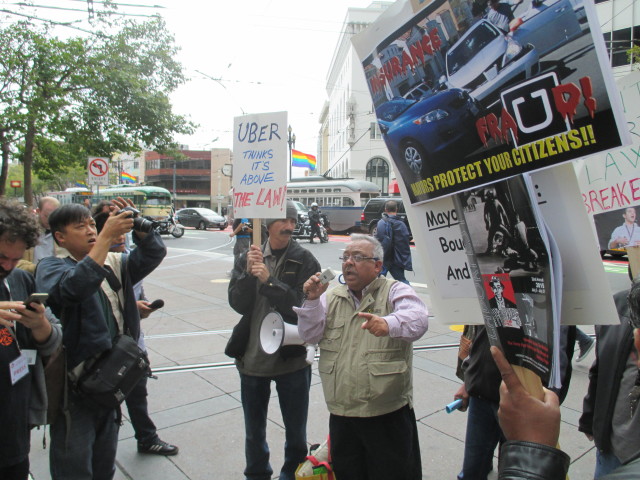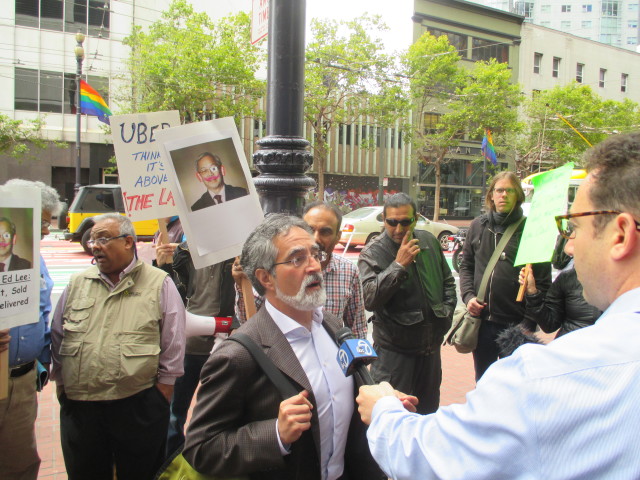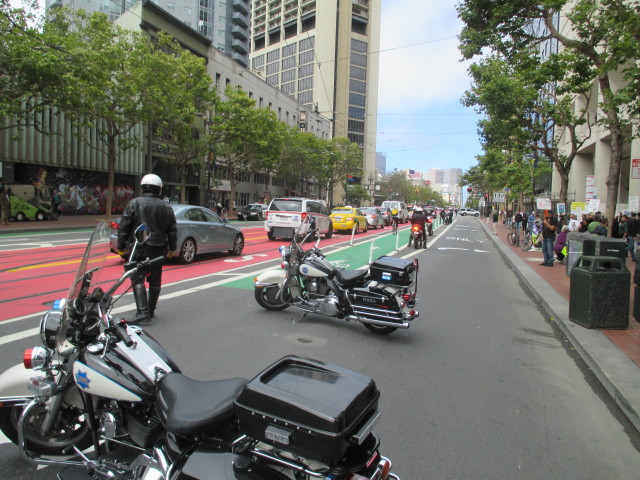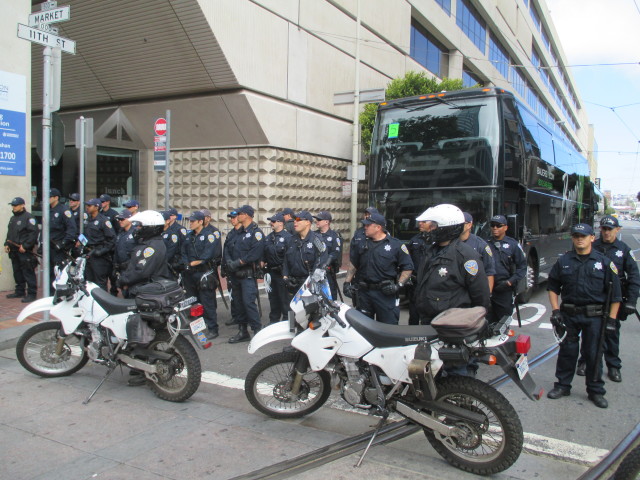Local leaders pay homage to a company that got rich breaking local laws

By Tim Redmond
JUNE 22, 2015 — The US Conference of Mayors ended its San Francisco convention today with a visit to Uber, a company that got its start by breaking the laws in many of the cities whose elected leaders were on the tour.
A large police presence protected the $50 billion company and the visitors as a lively group of taxi drivers and their supporters protested outside.
No press was allowed into the Uber headquarters. Reporters were not invited on the tour. In fact, we weren’t allowed to speak to the mayors as they filed in behind barricades.
I tried a couple of times to shout questions, but the mayors ignored me and the police made sure I couldn’t get close enough to interview anyone.
Uber did not make a spokesperson available outside, and the one Uber employee who talked to me said she would pass on a message, which was ignored.
The drivers, on the other hand, had plenty to say. Their basic message: Uber ought to play by the same rules as everyone else.
At least one mayor is going further. Paul Soglin, mayor of Madison, Wisconsin, introduced a resolution to the conference stating that “the business model of transportation network providers such as Uber and Lyft does not provide equitable or reliable service to the broader public of for people with disabilities as these businesses seek to profit from peak demand in ways that will make it impossible for other more highly regulated taxicab services to be financially sustainable in many cities.”
The measure would have put the Conference of Mayors on record as calling on Uber and Lyft to halt operations until “such time that they are properly regulated and licensed pursuant to law.”
Needless to say, it didn’t pass.
I spoke with Nazeer Sadiq, who was a civil engineer in his native Pakistan and has spent 21 years driving a cab in San Francisco. He compared Uber’s influence in local politics to the corruption he saw before he immigrated to the United States.
“They are killing us,” he said.

Former Sup. Aaron Peskin, who is running again for the District Three job, showed up to show solidarity with the protesters. “I believe we ought to level the playing field,” he said. “We need to regulate the new economy so everyone plays by the same rules.”
Uber, of course, likes to say it isn’t a cab company, so its drivers don’t have to pay the same fees, undergo the same background checks, or get the same training as licensed taxi drivers in the city.
That’s the classic “sharing economy” model – break the laws and hope that later you can wrangle enough political influence to change them.
Peskin said that the Uber and Lyft drivers “are exploited too. It’s a race to the bottom.”
He also said – and I’m glad someone finally brought this up – that “as the Jewish guy here, I have to say that the name Uber really bothers me. It’s a symbol of the big people crushing the little people.”
But there was little concern for the little people in front of the Uber headquarters.

For about half an hour before the mayors arrived, real taxi drivers were circling the block, blowing their horns. But when the (private, luxury) buses were on their way from the conference hotel to 11th and Market, the police blocked off the lane of traffic in front of the building and forced the taxis – and all other drivers – to divert to the center lanes.
The afternoon traffic backed up as 11th Street was closed for more than two hours and the intersection of Market and 11th was a huge police scene. Police officials wouldn’t tell me why the street had to remain closed or why an entire lane of Market was shut down.
The convention buses never used that lane. They stayed parked on 11th, and a little after 4pm, the mayors, with a huge police tactical squad escort, left the building behind barricades and walked down Market, apparently to Twitter, which was also heavily guarded.

A couple of times I got the attention of some of the mayors by waving and asked what they thought about attending an event behind barricades. Nobody responded.
The whole thing was surreal. Here were the chief executives of dozens of cities, sworn to uphold their local laws, sneaking in and out of the headquarters of a building that is headquarters to what protesters say is one of the largest urban lawbreakers in America.
Uber would not have this fancy office, or its massive valuation, if it hadn’t found a way to provide taxi services without getting taxi permits. If the company had followed the rules, it wouldn’t have made so much money. And mayors who are supposed to make sure people follow the rules ought to recognize that.
Or you would think so.
But the infatuation with tech and its money has reached such a level that we have mayors from all over the country ignoring protesters, cutting out the press, and paying homage to billionaires who made their fortunes by cheating.
Amazing. Or maybe not.






